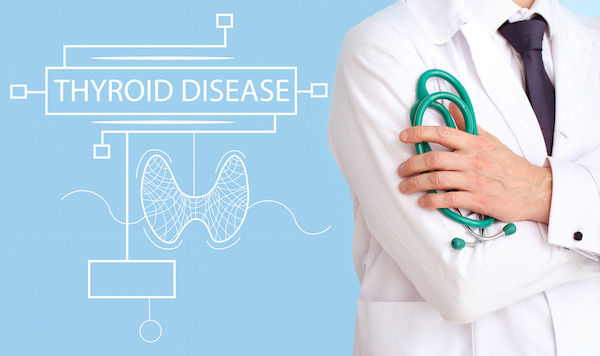Underactive Thyroid: Causes, Symptoms And Management
Discover the causes, symptoms, and management of an underactive thyroid. Learn how to identify and treat hypothyroidism for better health and well-being.

Written by Dr Sonia Bhatt
Last updated on 3rd Jul, 2025
The thyroid gland produces hormones like thyroxine (T4) and triiodothyronine (T3) to regulate metabolism. The hypothalamus and pituitary glands release thyrotropin-releasing hormone (TRH), prompting thyroid-stimulating hormone (TSH) for T3 and T4 production. Adequate T3 and T4 hormone levels are essential for multiple bodily functions.
Any abnormality in thyroid production results in conditions like underactive or overactive thyroids. Keep reading for a detailed insight into the cause, effects, types, medication, etc. of underactive thyroid.
What is an Underactive Thyroid?
An underactive thyroid, or hypothyroidism, is a condition in which the thyroid gland does not produce enough thyroid hormones. Consequently, the pituitary gland produces excessive thyroid-stimulating hormone (TSH), disrupting the body’s hormonal balance and affecting various vital functions.
Inadequate hormone production leads to four types of underactive thyroid:
1.Primary Hypothyroidism
It is the most common type of hypothyroidism, caused by autoimmune diseases (Hashimoto’s disease) or may occur after radiation therapy or surgery of the thyroid gland.
2.Secondary Hypothyroidism
In some individuals, the underactive pituitary gland fails to send enough TSH to the thyroid gland. This rare symptom is secondary hypothyroidism.
3.Tertiary Hypothyroidism
It occurs when the hypothalamus (a brain structure that maintains body stability or homeostasis) cannot produce sufficient TRH (thyrotropin-releasing hormone).
4.Subclinical Hypothyroidism
This condition occurs when TSH levels rise slightly while other thyroid hormone levels remain normal. It resolves on its own within three months.
Causes of Underactive Thyroid
Here are some of the common causes of underactive thyroid:
Thyroiditis
Inflammation of the thyroid gland, or thyroiditis, can lead to the release of stored thyroid hormones. This initial release causes a temporary rise in hormone levels in the bloodstream, resulting in thyrotoxicosis (high thyroid hormone levels).
It may last for months, and then the person will experience an underactive thyroid. If not addressed on time, hypothyroidism or underactive thyroid becomes permanent, with thyroid hormone replacement being the only solution.
Congenital Hypothyroidism
In some babies, the thyroid gland is not well-developed and, thus, cannot function accordingly. It is called congenital hypothyroidism. Neglecting congenital hypothyroidism can make a child intellectually disabled.
Hashimoto’s Disease
One of the common reasons for hypothyroidism is Hashimoto’s disease. It is an autoimmune disorder in which a person’s immune system attacks his thyroid gland. As a result, the gland fails to produce the necessary hormone due to inflammation.
Partial or Total Thyroid Removal
Some people undergo thyroid surgery, where part of the thyroid is removed. In most cases, the remaining thyroid can produce adequate hormones, but some may develop hypothyroidism. Removing the entire thyroid gland always results in hypothyroidism.
Medication
Medications like amiodarone (for heart arrhythmias) and lithium (for bipolar disorder) can disrupt thyroid function. Additionally, cancer treatments such as Interferon-Alpha and Tyrosine Kinase Inhibitors (TKIs) may influence thyroid activity by affecting the immune system.
Radiation Treatment
One of the common treatments for hyperthyroidism (excessive hormone production) is radioactive iodine uptake. This treatment can affect the thyroid cells if continued for a long period, reducing hormone production. External radiation also treats cancers of the head and neck, increasing the chances of hypothyroidism.
Symptoms of Underactive Thyroid
There are multiple symptoms of hypothyroidism, but they vary slightly among individuals:
Common physical symptoms include:
- Fatigue
- Weight gain
- Cold intolerance
- Dry skin and hair
- Muscle weakness
- Constipation
- Slow heart rate
- Hair Thinning
- Irregular or heavy menstrual cycle
Cognitive and emotional symptoms may also occur, such as:
- Depression
- Memory problems
- Concentration issues
- Mood swings
Consult Top Doctors For Hypothyroidism
Diagnosis of Underactive Thyroid
Doctors begin the diagnosis by palpating the thyroid and surrounding area to check for swollen glands. Next, they check for symptoms and review the patient's medical history.
However, this is not the best way to diagnose hypothyroidism because other medical conditions may also have the same symptoms. Thus, the following medical tests are essential to detect hypothyroidism:
- Thyroid Blood Tests (measure levels of T3, T4, and TSH)
- Computed Tomography Scan
- Ultrasound
- Thyroid Uptake Scan, etc.
Get Your Hypothyroidism Checked
Treatment Options for Underactive Thyroid
One of the most common and effective treatment options for hypothyroidism is hormone replacement therapy. Doctors prescribe medicines containing levothyroxine to replace the hormone that the thyroid gland fails to produce. Regular intake of levothyroxine can normalise the hormone level and reduce the symptoms of underactive thyroid.
However, understanding the right dosage for hypothyroidism needs routine blood tests till the hormone levels come to the normal level. Intaking hypothyroidism medications for a lifetime with regular checkups ensures a healthy life.
Managing Underactive Thyroid with Lifestyle Changes
In addition to medication, certain lifestyle modifications can support overall health in individuals with hypothyroidism.
Dietary Considerations
Eating habits play a significant role in managing an underactive thyroid. A balanced diet containing fruits, vegetables, whole grains, lean proteins, and healthy fats is recommended. Adequate iodine intake is necessary for healthy body function, but excessive iodine can worsen symptoms.
The Role of Exercise and Stress Management
Regular physical activity helps control fatigue associated with hypothyroidism. Additionally, stress management techniques such as yoga or meditation can improve overall well-being.
Complications if Underactive Thyroid is Left Untreated
An underactive thyroid, if left untreated, can cause the following complications in an individual:
Goitre
Excessive hormone production can result in swelling of the thyroid, affect the appearance of the neck, cause issues in swallowing, etc.
Infertility
Insufficient hormone production can affect ovulation, causing conceiving problems.
Heart Issues
An underactive thyroid increases the Low-Density Lipoprotein level (bad cholesterol), increasing the risk of heart disease.
Mental Health Issues
Low hormone levels affect concentration and memory, reduce an individual's interest even in enjoyable activities, and can lead to depression.
Obesity
Hypothyroidism causes low appetite in individuals but increases their weight due to slow metabolism.
Joint Pain
Insufficient hormone levels also cause pain in muscles, joints, and tendonitis.
Peripheral Neuropathy
If left untreated for long, an underactive thyroid can damage an individual’s peripheral nerves, causing tingling, numbness, or pain in limbs.
Prognosis and Long-Term Management
Though there is no permanent cure for hypothyroidism, regular medication and hormone replacement therapy can keep the situation under control. Opting for an immediate diagnosis and taking regular medication can help individuals avoid worse situations like myxedema (a severe form of hypothyroidism).
Conclusion
Early detection of an underactive thyroid can help treat or manage this disorder effectively. Proper medication and a healthy lifestyle can keep it under control, but a complete cure is not possible. Upon identifying the symptoms of an underactive thyroid, individuals should undergo medical interventions to avoid other health complications.
Consult An Endocrinologist
Consult Top Doctors For Hypothyroidism

Dr. Anand Ravi
General Physician
2 Years • MBBS
Bengaluru
PRESTIGE SHANTHINIKETAN - SOCIETY CLINIC, Bengaluru

Dr. Nithin Reddy Modhugu
Endocrinologist
6 Years • MBBS, MD (General Medicine), DNB (Endocrinology)
Hyderabad
Dr. Nithin's Endocrine Clinic, Hyderabad
(100+ Patients)

Dr. Gayatri S
Endocrinologist
4 Years • Suggested Qualifictaion- MBBS, MD (Internal Medicine), DM (ENDOCRINOLOGY)
Nellore
Narayana hospital, Nellore

Dr. Shrikrishna V Acharya
Endocrinologist
25 Years • MBBS, MD, DM(Endocrinology), MRCP (Endocrinology)
Bengaluru
Apollo Clinic, JP nagar, Bengaluru

Dr. E Prabhakar Sastry
General Physician/ Internal Medicine Specialist
40 Years • MD(Internal Medicine)
Manikonda Jagir
Apollo Clinic, Manikonda, Manikonda Jagir
(125+ Patients)
Consult An Endocrinologist

Dr. Anand Ravi
General Physician
2 Years • MBBS
Bengaluru
PRESTIGE SHANTHINIKETAN - SOCIETY CLINIC, Bengaluru

Dr. Nithin Reddy Modhugu
Endocrinologist
6 Years • MBBS, MD (General Medicine), DNB (Endocrinology)
Hyderabad
Dr. Nithin's Endocrine Clinic, Hyderabad
(100+ Patients)

Dr. Gayatri S
Endocrinologist
4 Years • Suggested Qualifictaion- MBBS, MD (Internal Medicine), DM (ENDOCRINOLOGY)
Nellore
Narayana hospital, Nellore

Dr. Shrikrishna V Acharya
Endocrinologist
25 Years • MBBS, MD, DM(Endocrinology), MRCP (Endocrinology)
Bengaluru
Apollo Clinic, JP nagar, Bengaluru

Dr. E Prabhakar Sastry
General Physician/ Internal Medicine Specialist
40 Years • MD(Internal Medicine)
Manikonda Jagir
Apollo Clinic, Manikonda, Manikonda Jagir
(125+ Patients)




